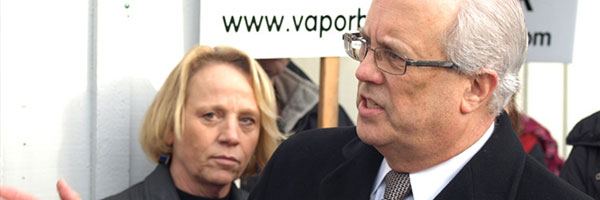
Coun. Carol Day and Mayor Malcolm Brodie at a jet fuel pipeline protest last year.
by Matthew Hoekstra – Richmond Review
posted Feb 13, 2015 at 4:00 PM
Elected officials at Richmond City Hall lobbed more criticism at Port Metro Vancouver this week as the prospect of preserving farmland grows increasingly bleak.
“They’re the biggest threat to farmland, not just in Richmond, but everywhere else,” said Coun. Carol Day Tuesday.
Port Metro Vancouver is “a pending threat” to the future of agricultural land, senior city officials told council in a report that probed the federal agency’s new land use plan. That plan, staff found, offers no assurances that farmland would be protected from port expansion.
The port already controls a large area of East Richmond, and city hall has no power to stop its expansion. It nonetheless voted 9-0 to tell the port it “strongly objects” to the plan, which guides development of port lands and waters for the next 20 years.
Said Coun. Derek Dang: “Just because you have an in because you’re a federal agency doesn’t mean you should bully your way through.”
Port officials say the plan, finalized last fall, responds to growth in Canada’s trade while protecting the environment and “contributing positively” to First Nations and local communities.
But Coun. Bill McNulty said it offers little to Richmond, while jet fuel tankers and coal barges pass by.
“You’ve got a body that really doesn’t have a lot of people to answer to,” he said.
City officials say the port has announced a need of 930 hectares (2,300 acres) of land to meet its long-term needs. If a land shortage arrives in 10 to 15 years, the plan’s “special study areas”—including 97.2 hectares (240 acres) of Agricultural Land Reserve in Richmond—could become expansion sites.
The city is suggesting the port instead only expand in designated industrial areas, as mapped by Metro Vancouver’s regional growth strategy and the city’s official community plan. It’s an idea the city has repeatedly suggested, according to Coun. Linda McPhail.
“I believe it’s time we ramp up our advocacy to the federal government, and that a collaborative action plan can be taken with other municipalities to oppose the adopted Port Metro Vancouver land use plan.”
Coun. Ken Johnston said the port’s plan cites the increasing potential for conflict between the working waterfront and the adjacent land.
“They’re basically telling us in the land use report we’re going to have a fight over agricultural land versus industrial land versus expansion of the port. That’s certainly how I read that.”
Port operations in Richmond came into focus once again at B.C. Supreme Court this week. A citizens’ group, Vancouver Airport Fuel Project Opposition for Richmond, is challenging a provincial decision to allow jet fuel tankers on the Fraser River. Arguments for the case against the Vancouver Airport Fuel Facilities Corporation and its $100-million jet fuel pipeline project resumed this week.




